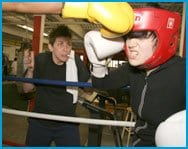Everyone has a story about how they ended up boxing with the Newsgirls. Mine can be traced back to my friend Snakebite. About five months ago she convinced me to join the gym by telling me I would never have to hit anybody and that she’d buy me lunch after the two-and-a-half hour workout.
Being that I’ve never considered myself athletic — I was the kind of kid who faked sick to get out of gym class — it was pretty remarkable that Snakebite convinced me to try out such a demanding sport. While these past months have taught me a lot about the history of boxing and the technique involved — offence, defence, grounding and footwork — more than anything else I’ve gained a community.
The Toronto Newsgirls, the honoured group in this year’s Dyke March, formed at Sully’s boxing gym in the late 1990s. Savoy “Kapow” Howe, the founder and head coach of the Newsgirls, came to boxing as a way to let off steam, and quickly discovered that she wasn’t the only lady looking to get sweaty. The Newsgirls began as a weekly women-only boxing class, which helped Howe supplement her income and pay for her training. But it soon became evident to Howe that there was a need for a women-only gym. After a few years of weekends in the men’s gym (followed by a couple of months boxing in local parks) the Newsgirls finally found a permanent home at Gerrard and Carlaw.
It was hearing the evolution of the Newgirls that persuaded me to check it out, coupled with the fact that I’ve often felt out of place in mixed gyms. A boxing gym with a queer history? Sign me up!
Still, walking into that building for the first time, I felt certain that I was setting myself up for a high-school-gym-class-style horror story, which couldn’t have been further from the truth. Instead of a hyper-competitive, hyper-masculine jock environment I found jocks with consciences and heart. The Newsgirls are women from all walks of life — social and community workers, journalists, teachers, opera singers, secretaries, artists, musicians. They’re a group of women who beat each other up and then grin through bloody noses.
One of the best things about the Newsgirls is that it’s forced me to confront my assumptions of what an athlete looks like. While I knew that the gym was queer-friendly and obviously woman-centred, I wasn’t expecting the kind of diversity that is so much a part of the club. There is no such thing as a typical Newsgirl. We come in all shapes and sizes, all races, all genders, all sexualities. The only constant is boundless respect and mutual admiration. At times the whole thing feels like a great big love in, solidified every time women knock gloves in greeting or shout encouragement from the side of the ring.
If the boxing gym is a community then Howe is its facilitator, its instigator and the reason many of us continue to train. Her warmth, insight and sense of humour are an undercurrent through everything that goes on at the gym, including her commitment to nicknaming every boxer at the rookie stage to help them feel part of the community. After observing my style I was given the nickname “Slick” and a signature move called “the Gino,” which involves sliding my left hand through my hair as I throw my power punch with my right (though, let me add, that this is a technique I have yet to master).
The night after my first class I excitedly told my father about my experience at the gym. He listened to my story and then informed me that Slick was the nickname of my deceased grandfather who, unbeknownst to me, had also been a boxer.
Savoy’s response when I told her this highlighted what I love most about her approach; in turn she told me her own story, about her own sense of belonging in the space, and about her conviction that the people who were in it were meant to be there. “You know what it means,” she said. “It’s in your blood. You have to come back.” I couldn’t agree more.
But there is one point on which I disagree with Howe. In her comments on the Pride website in response to the Newsgirls being named the honorary dyke group she wrote, “Boxing is defending one’s rights to the core.”
To me it’s proved to be much bigger than that. Boxing is defending my rights and the rights of our communities. It’s defending the rights of women, of queers and genderqueers and trans people, of people of colour, of people in general, simply by taking up space and standing ground as a community, in solidarity with each other. When the Toronto Newsgirls march in this year’s Pride parade as the honoured dyke group I’ll be holding my gloves high.

 Why you can trust Xtra
Why you can trust Xtra


